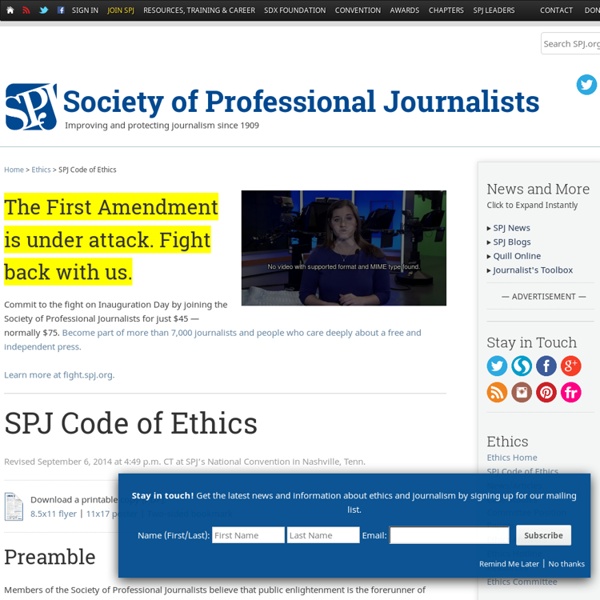Mission
The Online News Association is composed largely of professional digital journalists. Founded in 1999, ONA now has more than 2,000 professional members whose principal livelihood involves gathering or producing news for digital presentation. The membership includes news writers, producers, designers, editors, photographers, technologists and others who produce news for the Internet or other digital delivery systems, as well as academic members and others interested in the development of online journalism.
Objectivity (journalism)
Journalistic objectivity is a significant principle of journalistic professionalism. Journalistic objectivity can refer to fairness, disinterestedness, factuality, and nonpartisanship, but most often encompasses all of these qualities. Definitions[edit]
Juan Williams Case Confuses Objectivity with Fairness on Tendentious Television
When Spiro Agnew was compelled to resign the vice presidency after pleading no contest to tax evasion charges, I made the mistake of accepting an invitation to appear on David Susskind’s televised talk show. It was, I naively thought, an opportunity to discuss in detail how that complicated politician had gotten in trouble accepting cash and groceries while governor of Maryland and as vice president. But the 1973 Susskind program quickly devolved into a clash of loud opinions among William Rusher, Roy Cohn, Pete Hamill, Jules Witcover and Frank Van Der Linden, as I sat mostly mute. During a commercial break, a producer came to me and said, “Get in there and mix it up.” I did not, and never again accepted an invitation to appear on the increasingly tendentious telecasts that masquerade as news analysis. NPR was right to sever its relationship with Juan Williams — but not for what Williams had said about Muslims on the Fox Network’s “O’Reilly Factor.”
Eco-Logica Magazine
Prevención de incendios forestales, agua, aire, reciclaje del aceite de auto...y mucha información útil./Prevent wildfire, recycle your motor oil... and lots of useful information. Puget Sound Más allá de la casa/Beyond our house Apaga el motor/Turn off your engine. Ayuda a mantener una buena calidad del aire/Help to keep good air quality Cosas interesantes/Interesting things ¿Qué es esto? ¿Cómo se hace?/What's this?
Tools and Resources (for all)
Part I: The Origins of Copyright By J.S. Ackerman "The Copyright Office's mission is to promote creativity in society by creating and maintaining the public record through registration of claims and recordation of documents."
The Myth of Objectivity in Journalism
by This page has been accessed since 29 May 1996. The oft-stated and highly desired goal of modern journalism is objectivity, the detached and unprejudiced gathering and dissemination of news and information.
The Voice of God Is Dead
It's past time for news outlets to lose the rigid, formulaic approach to newswriting. But figuring out the boundaries can be tricky. Wed., April 4, 2012. By Jena Heath Jena Heath (jenaheath@gmail.com) spent 17 years as a newspaper reporter and editor. In 2008, she joined the faculty at St. Edward’s University in Austin, where she is an assistant professor of English Writing and Rhetoric-Journalism and faculty adviser to the student newspaper
Bothell Landing - Downtown Revitalization - Overview
It is the year 2025 and the Bothell Downtown Revitalization Plan has been fully implemented. As in 1913, city leaders once again understand and value the importance of transit and connectivity. Major roadway improvements have been implemented for SR 522 and 527, creating new development parcels and tree-lined pedestrian friendly streets that also support vehicular access. The Wayne Curve has been widened and improved and a more welcoming entrance to Bothell has been created.
Electronic Journalism and International Editing Standards
Participants also learned how to write and adapt stories for news Web sites examined and compared news Web sites from Arabic-speaking countries and from countries around the world.Photo by Hoda Osman In cooperation with the Prince Ahmed bin Salman Applied Media Institute, ICFJ conducted its first training courses in Saudi Arabia entitled Electronic Journalism and International Editing Standards. The two courses were given to 13 female Yemeni journalists and six female Saudi journalists also participated in the Electronic Journalism course. The Electronic Journalism course tackled differences between the traditional media and New Media, explored different types of news Web sites and experimented with the use of multimedia.
The Fading Mystique of an Objective Press
It is worth noting that non-partisan (i.e., objective) reporting coexisted easily in the same penny papers with such pungent sensationalism. “Neutrality will sleep with anyone,” as the saying goes. Right there at the creation of the modern press, paradoxes abounded. Bennett and other penny publishers touted nonpartisanship, yet on issues that were universally applauded the pennies were rabid advocates. Bennett for example was always super patriotic and always proslavery, both being conducive to pleasing his readers and thus to producing profits. During the 20th century, the ideal of objectivity in news coverage went from strength to strength.
Screening for bias
The Corporation for Public Broadcasting angers critics with conservative programming. From the Summer 2005 issue of The News Media & The Law, page 36. By Tom Sullivan Not wanting a world without Big Bird or Clifford the Big Red Dog, congressional leaders this summer restored threatened funding cuts to the Corporation for Public Broadcasting.
Privacy & Social Media Policy - Explore Bothell
Our Commitment to Privacy Your privacy is important to us. To better protect your privacy we provide this notice explaining our online information.
Journalists Denying Liberal Bias, Part One
In spite of overwhelming evidence to the contrary, many journalists still refuse to acknowledge that most of the establishment media tilts to the left. Examples: “I can see how the intensity of coverage on certain issues may, to some people, seem to reflect a liberal point of view.




Professional Journalism Organizations Which Cover Objectivity by kelly.ferguson Dec 9